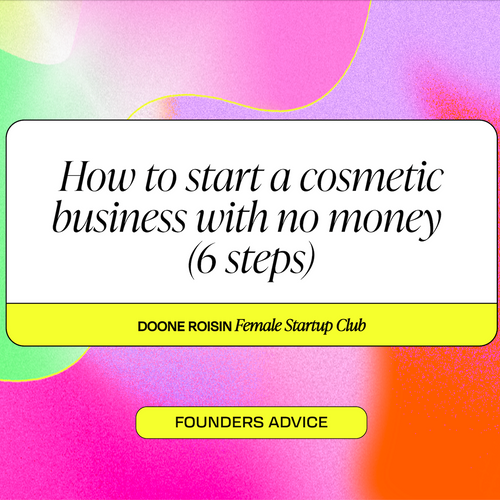
"No one ever bought a Lamborghini by working a 9 - 5" has become an extremely common statement in today’s hustle culture. Whether true or not, DTC businesses have become one of the most common solutions. Unfortunately, starting one isn't common knowledge, especially as a female founder. Our mission with Female Startup Club is to turn that on its head.
More than a podcast, Female Startup Club is an educational platform that provides insightful podcasts and technical business courses that are easily accessible to anyone. You're in the right place if you’re looking for a clear go-to strategy for starting your DTC business as a female founder.
To start a DTC business as a female founder, first, come up with a product. After this, prepare for launch by conducting market surveys, building an excellent supply chain management system, and marketing the product before launch.
Still, feeling overwhelmed at having to build a brand from scratch? Don't worry. We've got you covered.
How To Start a DTC Business
You need to know many things to start a DTC business, and a simple Google search will lead you down several rabbit holes. This is the last thing you need. In the age of information overload, we’ve distilled as much of it as we can into the following steps:
1. Ideation
To start a business, the product you plan to sell should be unique and innovative. If the problem you aim to solve isn't relatable to the target audience, they won't buy it. As Mimi Ikonn (creator of The 5 Minute Journal) said on Female Startup Club: “The best business you will create is the one that will come out of true challenges and problems.” Focus on providing a kick-ass incredible product that the world truly needs.
A good, well-planned idea can make a brand, but a poorly managed one can break the same brand. So, no matter how good your idea is, it must be adequately prepared and managed. This brings us to the next step.
2. Market Analysis and Surveys
You might have a great idea, but if there is no demand for your product in the market, you're setting yourself up for failure. So, once you have your winning idea, it’s essential to browse the market.
This will allow you to get a feel for your potential consumer base. Good marketplace analysis will also inform you about products similar to what you bring to the table. We recently discussed this journey process within Majic, our community of founders and future founders, and a super relevant resource popped up that will make this part of the journey much easier. You can use tools such as AMZScout. It’s a handy product research tool you can use by setting parameters and scouring the Amazon database to win product ideas.
This helps you improve your product based on the feedback you see on the already-available products in the market. Realistically, it might also warn you that the market you want to enter could be oversaturated.
3. Setting Up a Business Plan
The business plan is the operational blueprint of any and all businesses. Without a solid business plan, most companies are bound to fail.
While it sounds rather technical, a business plan is nothing but a document with information about a brand's business dealings. This includes market analyses, product details, fundraising, launch plans, marketing strategies, management information, revenue projections, etc.
It helps you have a clear vision of what the future of your business looks like.
4. Gather Your Capital
Even though DTCs cost less than a traditional business, not all business ventures can be started with the money you've saved up in the last few years. To be able to start a business, you need to consider all possible costs, from setting up an eCommerce website to the packaging.
After this, you can look for sponsors willing to invest in your idea. These sponsors (and the money they provide) will be your company's foundation.
5. Product Manufacturing
This step typically involves looking for several manufacturers and working on the initial prototypes.
It’s essential to take your time with this choice, as the quality of your service is one of the most vital points to your success. You can sign a contract with the manufacturers when satisfied with the results. But beware! Lisa Guerrera from Experiment Beauty recently warned us about the drama she had with her manufacturer in the brand's early days. A poor manufacturer relationship can cost you a lot of capital and time, so make sure this partnership is solid from the get-go.
6. Branding
Today's world is all about branding. We all know we love a pleasing aesthetic. Be it the brand name, the signature colors, the product packaging, the ad campaigns, or any other visual aspect, the branding is reflected throughout the product.
It is crucial to come up with a brand name that's not only easy to remember and unique but also has a story of its own. Take Female Startup Club, for example. Not only has this name worked hugely in our favor in terms of SEO purposes, but the name also has a story of its own, and you know exactly what we’re about. Don’t underestimate the power of a great name.
Besides this, all the brand logos and packaging, etc., should be designed by a professional. One wrong alphabet or color placement, and poof! The visual appeal of the brand is gone.
7. Hiring a Team
Having reached this point alone, you may think that you can see this project as a one-woman army. However, the fact is that you probably need to have a team of people with experience in different fields of interest.
Finances, for example, will be best handled by a business major. Similarly, someone with expertise in marketing is essential to help you understand how to push your product out into the real world. When it comes to hiring, the right people are often the people that are better than you. Some might find this a difficult pill to swallow. But hiring a copy of yourself isn’t good for the business you’re building. Hire based on your weaknesses. You’ll still be the founder. You’ll still call the shots. That was a great piece of advice from the co-founder of LUSH, Rowena Bird, who came to Female Startup Club to chat about building her 9-figure-empire.
8. Marketing
While traditional marketing techniques aren't entirely obsolete, considering today's norms, social media is your best friend in marketing. This means that getting in touch with influencers to promote your brand is typically a good idea.
Marketing is essential both before and after the launch. This helps initiate and maintain a steady customer inflow. Building a blog or a newsletter for the brand is a good idea for post-launch marketing.
On a personal level, this can be achieved by sending emails or SMSs to the customers who are subscribed to your newsletters. You can do this using apps like Klaviyo or Norby that make your life much easier while keeping you on brand. Within FSC’s private community, Majic, we hold a (seriously handy) bank of Klaviyo-focused SOPs and blueprints. You should come by and check it out.
9. Setting Up Shop
Next, you must set up a store where people can buy your products. Online stores are the first preference for new businesses because they are more accessible and cheaper.
Setting up a store, be it an eCommerce website or a walk-in location, is one of the most complex parts of getting into the DTC world.
Thankfully, platforms such as Shopify have made it easier for us to centralize and manage our businesses. Not only does Shopify provide you with an online platform to sell your product, but it also keeps track of your offline stores' inventory and sales data.
10. Delivering the Product
Now that you have set your business up and orders have started pouring in, you need to get these products to your customers. You can deliver the products if the business isn't too big or spread too far out.
However, if your business delivers to distant locations or you have too many orders to deliver (or preferably both), you must use a delivery service. These people will pick the order up from you and drop it at the customer's location.
You also want to be thinking twice about the types of material that you’re shipping. Katina Mountanos, founder of the olive oil brand Kosterina, ran into big problems shipping her product in glass. Shipping costs will be much higher, and you will have to expect things to go wrong and break sometimes. One of our Majic community members recently shared the same struggle and shifted her strategy to only shipping her product in 100% recycled plastic. Just make sure you go into this aspect of the business with open eyes.
11. Customer Service
There is no such thing as 100% customer approval. When you set up a new business, you will get customer reviews.
Handling, understanding, and acting upon customer criticism builds or breaks a brand. Making improvements based on client feedback is not only highly appreciated but also very rewarding.
Remember, the customer is always right (maybe not always, but you get what we mean).
What Are the Most Successful DTC Brands Right Now That We Can Take Pointers From
Millions of DTC brands exist; tons are women-owned businesses, so there are many examples to follow as a fresh-faced female entrepreneur. Some of these names might ring a bell:
SKIMS
Speaking of female entrepreneurs, how can we not mention the self-made billionaire Kim Kardashian? We’d be lying if we said we weren’t low-key fans. SKIMS is a modern take on an underwear, shapewear, and loungewear brand.
One of the critical pointers of SKIMS is that it has changed people's views on shapewear and loungewear. SKIMS has allowed shapewear and loungewear to cross into everyday fits by making them more stylish and comfortable.

SKIMS also uses quality materials, has a wide range of colors to match various skin tones, and features a rather inclusive size chart. This has helped the brand appeal to a larger audience and amass a considerable following. Which, in numbers, translates to success.
Kylie Cosmetics
We can’t discuss Kim and not include King Kylie in the list. Kylie Cosmetics started with their iconic lip kits, the brainchild of Miss Kylie Jenner.
Most of the success of Kylie Cosmetics can and should be credited to the social media influence Kylie has. Kylie's social media dominion is undeniable, with an Instagram following of a whopping 378 million.
With such a vast following comes easier marketing, product advertisement, and a huge potential customer base.
Kylie knew how to properly use her following and, lo and behold, formed a successful business. This has allowed her to explore other business ventures and expand her market.
ColourPop
Co-founded by Laura Nelson, ColourPop is a force to be reckoned with. All the millennial girls had at least one ColourPop eyeshadow palette in their arsenal. Till today, the brand hasn't lost its charm.
What has kept ColourPop going throughout these years is its pricing. In a world where cosmetic companies keep marking their products up, ColourPop has never failed to deliver an outstanding balance of quality and affordability.
The consistent affordability of ColourPop's products appeals to their customer base. This customer base, in return, is loyal to the brand and helps generate revenue for it.
Fenty Beauty
Rihanna founded Fenty Beauty in 2017 and has yet to set foot wrong.

With people of color finding their perfect shade matches for the first time ever, Fenty Beauty gained an instant following and an emotionally invested consumer base.
The main focus of Fenty Beauty has always been inclusivity. Even with sister brand Savage X Fenty, inclusivity is the selling point and has proven great.
Conclusion
Building DTC startups as female founders can be intimidating, but it doesn’t need to be. These 11 steps are a great starting point. But, they are broad overviews. If you’re serious about launching your brand, you must do extra research on each point.
If you liked this article, you might enjoy receiving some of this research directly into your inbox every Monday. At Female Startup Club, we send out a weekly email jam-packed with insights from the podcast, covering all you need to know about starting a business in 2023. Sign up right here.
I won’t lie to you and say it will be easy, but with these steps and a little elbow grease, you’ll be on your way to a budding startup. Who knows? You might be the next prominent female entrepreneur.



